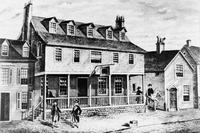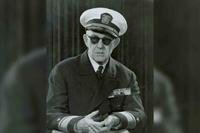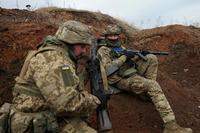The Medal of Honor is the United States' highest military honor, presented by the president of the United States in the name of Congress. It was first introduced during the first year of the Civil War as a Navy award for distinguished service by enlisted men. In 1862, a Medal of Honor was introduced for the Army's enlisted corps.
By 1863, the Medal of Honor became permanent and was made available to officers as well. It has undergone a number of design changes over the years, including separate versions for the Army, Navy and Air Force.
It has also become more exclusive in that time, recognizing only the most heroic acts of valor on the battlefield. In honor of March 25 being National Medal of Honor Day, here are a few more reasons this medal is so significant.
1. The Medal of Honor almost never happened.
When the Civil War first broke out, a battlefield medal was considered by the Army but rejected by Lt. Gen. Winfield Scott, commander of the U.S. Army. He considered battlefield decorations a European tradition and refused to accept the idea.
Almost as soon as he retired in 1861 and could no longer hold up the idea, the Navy adopted its Medal of Honor. The Army followed suit within a year. The first Medals of Honor were awarded in 1863.
2. Most Medals of Honor were awarded during the Civil War.
According to the Congressional Medal of Honor Society, 1,523 Medals of Honor were awarded during the Civil War, 43% of all 3,530 medals ever awarded. The conflict with the second-highest number of Medals of Honor was World War II, with 472, just more than 13%. As the only battlefield decoration at the time, the bar for receiving one wasn't as high.
Congress and the War Department began to get more and more strict about presenting the award. Although some were awarded for peacetime bravery and to civilians, Congress made permanent changes in 1918. The Medal of Honor would be awarded to an American who would "distinguish himself conspicuously by gallantry and intrepidity at the risk of his life above and beyond the call of duty" and "in action involving actual conflict with an enemy."
3. Medals of Honor have been rescinded.
With those new criteria in mind, Congress struck 911 medals from the Medal of Honor list. A commission of five retired Army generals reviewed the 2,625 Medals of Honor that had been awarded up until that time.
That commission found 864 Medals of Honor had been mistakenly presented to the 27th Maine Volunteer Infantry Regiment in 1863. One recipient received his by asking for it. Others got one for just doing their job. One, Dr. Mary E. Walker, a contract surgeon for the Union Army, received one after the war, but Congress tried to rescind it because she was a woman.
Read: Why the United States Revoked Hundreds of Medals of Honor
4. Many recipients die during their Medal of Honor actions.
Of the 3,530 Medal of Honor recipients, 618 lost their lives in action, a death rate of more than 17%. When counting only the Medals of Honor received after the 1918 congressionally enforced standards, that number balloons to more than 49%.
Although some Medals of Honor were awarded until 1945 for actions outside of combat, the number isn't large enough to greatly affect the fact that receiving a Medal of Honor typically reflects actions taken in incredibly dangerous situations that often result in the death of an American hero. Those who do survive are often still wounded or suffer from psychological trauma.
5. The Medal of Honor comes with special benefits.
Receiving the nation's highest honor from the leader of the free world is a pretty great perk in and of itself, but there are a number of other special benefits Medal of Honor recipients get when they're approved for the award.
It comes with a monthly pension, special retirement pay, uniform allowances, travel benefits, invitations to presidential inaugural balls and appointments to military academies for their descendents, just to name a few.
Read: 8 Special Benefits Medal of Honor Recipients Get for Their Exceptional Service

6. It's not required to salute the Medal of Honor, but we do anyway.
The Medal of Honor is at the heart of a rare occurrence, one of the few times a person of higher rank salutes a lower rank. There's nothing in law or regulations (except for the Air Force) that states a military member has to salute someone who has earned the Medal of Honor, but uniformed personnel do it as an act of respect.
Moreover, the uniformed service member will salute a recipient of the Medal of Honor, whether or not that person is in uniform. It's just that respected among U.S. military members.
-- Blake Stilwell can be reached at blake.stilwell@military.com. He can also be found on Twitter @blakestilwell or on Facebook.
Want to Learn More About Military Life?
Whether you're thinking of joining the military, looking for post-military careers or keeping up with military life and benefits, Military.com has you covered. Subscribe to Military.com to have military news, updates and resources delivered directly to your inbox.















